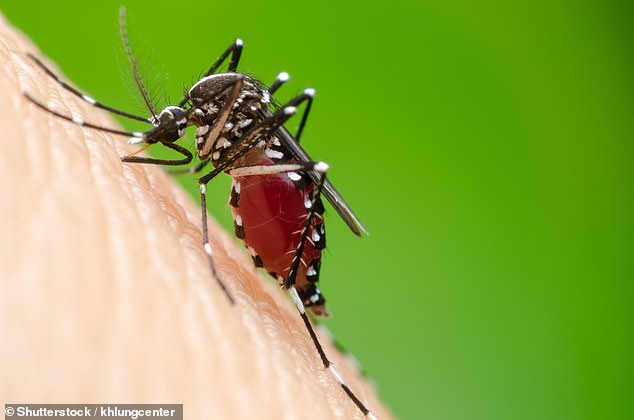It’s usually found in tropical and subtropical regions, including the Caribbean, Central America, South America, Southeast Asia, Pacific Islands.
But dengue fever could soon spread to Britain, a new study has warned.
Experts from the University of Montpellier say that climate change could create the perfect conditions for the Asian tiger mosquito – the insect that transmits the virus – in Western Europe.
Their models suggest that rising temperatures could spark outbreaks in cities including London, Vienna, Strasburg, and Frankfurt.
Worryingly, this could happen within a matter of years, according to the team.
‘It is estimated that the mosquito could establish itself in northern France within a decade, from where it could easily reach London—which is already climatically suitable for hosting this vector,’ said Dr Andrea Radici, lead author of the study.
While dengue fever is not usually serious, this is not always the case.
‘Rarely, dengue can be severe and lead to death,’ the World Health Organisation (WHO) warns on its website.

Experts from the University of Montpellier say that climate change could create the perfect conditions for the Asian tiger mosquito – the insect that transmits the virus – in Western Europe

Dengue fever is a viral infection that spreads from mosquitoes to people. It is more common in tropical and subtropical climates – and the incidence has grown dramatically in recent decades
Dengue fever is a viral infection that spreads from mosquitoes to people.
It is more common in tropical and subtropical climates – and the incidence has grown dramatically in recent decades.
In 2000, the WHO reported 505,430 cases around the world.
However, by 2019, this figure had risen to a staggering 5.2 million.
The virus is transmitted by the Asian tiger mosquito, which lays its eggs in water where, with sufficient temperature, larvae develop and give rise to flying bloodsucking adults.
While this species is usually found in the tropics and sub–tropics, it is slowly but surely making its way across Europe.
The Asian tiger mosquito was first reported in Albania in 1979, and has since spread through Southwest Europe.
Now, using modeling and observations of recent spread, the researchers have revealed where it could spread to next.

The virus is transmitted by the Asian tiger mosquito, which lays its eggs in water where, with sufficient temperature, larvae develop and give rise to flying bloodsucking adults (stock image)
According to their analysis, under the right climate change conditions, major cities like London, Vienna, Strasburg, and Frankfurt will soon be ‘well suited’ to the Asian tiger mosquito.
Although the species is not in these cities yet, its rate or northward spread in France has been accelerating from about 6km (3.7 miles) per year in 2006 to 20km (12.4 miles) per year in 2024.
This suggests that the mosquito could thrive in northern France by 2035 – and could reach London shortly after.
So far, only one vaccine has been approved and licensed against dengue fever, although several additional vaccines are under evaluation.
Worryingly, dengue fever isn’t the only infection that this species transmits.
‘In addition to Dengue fever, the Asian tiger mosquito also transmits Zika and chikungunya,’ the researchers added.












